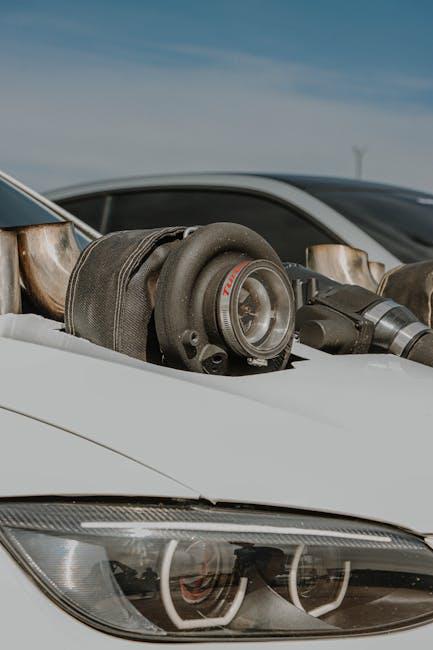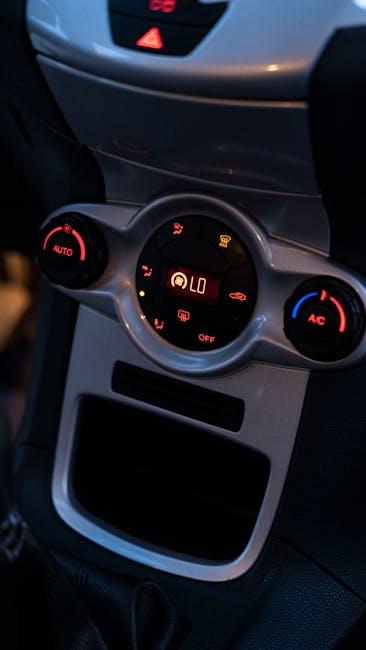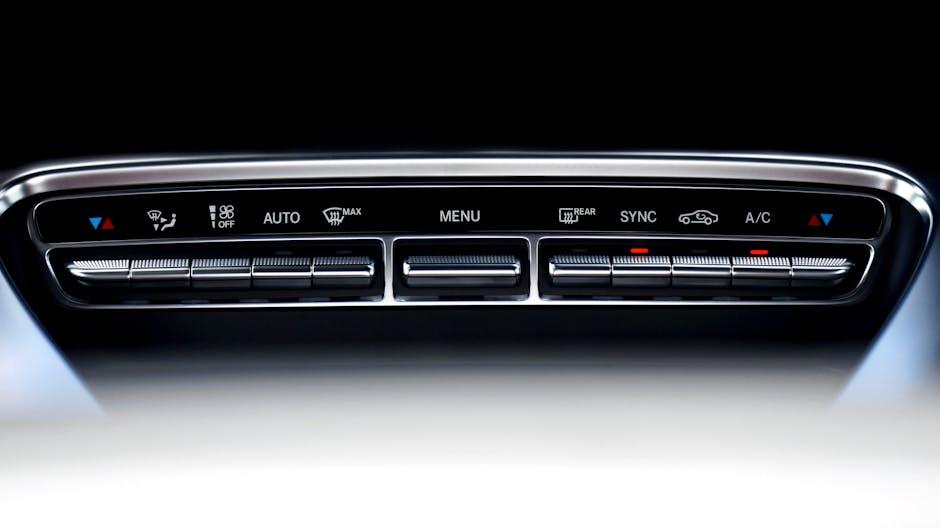Imagine stepping into your car on a scorching summer day, only to be greeted by a warm gust of air instead of the refreshing chill you expect. Your car’s air conditioning system, once a reliable sanctuary from the heat, suddenly seems to have lost its magic. This inconvenient hiccup not only disrupts your comfort but can also signal deeper issues lurking beneath the surface. Understanding why your car’s AC blows warm air is the first step to restoring that cool breeze and getting your ride back to peak comfort. In this article, we’ll explore the common causes behind this frustrating problem and guide you through the basics of troubleshooting your vehicle’s climate control.
Table of Contents
- Common Causes Behind Your Car AC Blowing Warm Air
- How Refrigerant Levels Affect AC Cooling Efficiency
- Diagnosing Compressor Problems and Their Impact on Cooling
- The Role of the AC Condenser and How to Keep It Functioning
- Why Electrical Issues Can Lead to Warm Air from Your AC
- Maintenance Tips to Prevent Your Car AC from Blowing Warm Air
- Q&A
- Wrapping Up

Common Causes Behind Your Car AC Blowing Warm Air
When your car’s air conditioning system starts blowing warm air instead of that refreshing cool breeze, several underlying issues might be at play. Often, the culprit is a refrigerant leak. Over time, tiny cracks or holes in the AC lines or the condenser may allow the refrigerant to escape, preventing the unit from effectively cooling the air. Another common cause is a malfunctioning compressor, which acts as the heart of your AC system—if it fails to circulate refrigerant properly, the cooling cycle breaks down. Additionally, a clogged or dirty condenser reduces airflow and heat dissipation, leaving you with warm air coming out of the vents.
Other important factors to consider include the condition of the AC’s electrical components and controls, which can fail and disrupt the cooling process. Sometimes, the issue is as simple as a dirty cabin air filter that restricts airflow and decreases cooling efficiency. Below is a quick reference checklist to help diagnose common problems:
| Issue | Symptom | Potential Fix |
|---|---|---|
| Refrigerant Leak | AC blows warm after some time, hissing sounds | Recharge refrigerant, fix leaks |
| Compressor Failure | AC clutch doesn’t engage, no cooling | Replace or repair compressor |
| Clogged Condenser | Reduced airflow, warmer air | Clean condenser fins |
| Electrical Issues | AC intermittently fails | Inspect wiring, fuses |
| Dirty Cabin Filter | Weak airflow, musty odor | Replace filter |

How Refrigerant Levels Affect AC Cooling Efficiency
When the refrigerant in your car’s AC system is low, the cooling process becomes drastically inefficient, causing the air blowing from the vents to feel warm instead of refreshingly cold. Refrigerant is the lifeblood of the AC system—it absorbs heat from the cabin air and releases it outside, ensuring you stay cool. If there’s insufficient refrigerant, the system struggles to produce the cold pressure needed for comfortable airflow. This can lead to the compressor working overtime, increased wear and tear, and ultimately, a decline in overall AC performance.
Keeping the perfect balance of refrigerant is essential for optimal efficiency. Consider these key indicators that your levels might be off:
- Weak airflow despite the blower fan running at full power
- Ice formation on the AC lines, a sign of freezing due to low pressure
- AC cycles on and off unexpectedly, trying to maintain temperature
| Refrigerant Level | Expected AC Performance |
|---|---|
| Optimal | Strong, cold airflow consistently maintained |
| Low | Warm air, inconsistent cooling |
| Too High | Pressure issues causing compressor strain |
Regularly checking and maintaining the right refrigerant level not only preserves airflow quality but also extends the life of your AC components. Ignoring this critical aspect can lead to costly repairs and the frustration of an underperforming system during the hottest drives.

Diagnosing Compressor Problems and Their Impact on Cooling
When your car’s air conditioning starts blowing warm air, the compressor is often at the heart of the problem. This vital component is responsible for pressurizing and circulating the refrigerant through the AC system. If the compressor fails to function properly, the refrigerant won’t cool down effectively, leaving you with lukewarm or hot air. Common signs include unusual noises like grinding or rattling, a noticeable decline in cooling performance, or even the AC system shutting down altogether. Sometimes, the compressor clutch may fail to engage, disabling the whole cooling cycle. Diagnosing these issues early can prevent more extensive damage and costly repairs.
The impact of a faulty compressor extends beyond just comfort—it can affect the entire AC system. For instance, a damaged compressor might cause the refrigerant pressure to drop, which can subsequently strain other components such as the condenser and evaporator. Below is a quick overview of common compressor problems and their effects:
| Compressor Issue | Impact on Cooling | Possible Cause |
|---|---|---|
| Clutch Failure | AC won’t engage, no cooling | Electrical fault or worn parts |
| Refrigerant Leak | Reduced cooling efficiency | Seal damage or corrosion |
| Internal Damage | Noise, overheating, system failure | Wear and tear or contamination |
- Clogged or damaged valves can reduce refrigerant flow and pressure.
- Electrical issues may prevent the compressor clutch from engaging.
- Mechanical wear often leads to reduced compressor efficiency or failure.

The Role of the AC Condenser and How to Keep It Functioning
The AC condenser in your vehicle acts as the crucial middleman between the refrigerant and the outside air. It functions like a radiator but for your car’s air conditioning system, dissipating heat removed from your cabin to the atmosphere. When the hot gaseous refrigerant arrives from the compressor, the condenser cools it down and turns it into a high-pressure liquid. This cooling cycle depends heavily on the condenser being clean and unobstructed. Dirt, leaves, and debris can clog the condenser coils, preventing efficient heat exchange and causing your AC to blow warm air.
Maintaining the condenser’s performance is simpler than you might think. Here are some key practices to keep it running smoothly:
- Regularly clean the compressor and condenser surface to remove debris and dirt buildup.
- Check for leaks around the condenser lines using a UV dye or professional inspection.
- Ensure proper airflow by inspecting and replacing damaged cooling fans or obstructed grills.
- Schedule periodic AC system service to flush the refrigerant and maintain system pressure.
| Symptom | Possible Cause | Recommended Action |
|---|---|---|
| Warm air ventilation | Clogged condenser coils | Clean condenser and check debris |
| Refrigerant leakage | Damaged condenser or fittings | Get a professional leak repair |
| Poor cooling efficiency | Faulty cooling fan | Replace or repair fan |

Why Electrical Issues Can Lead to Warm Air from Your AC
Electrical malfunctions can disrupt the delicate balance of your vehicle’s air conditioning system. Components such as the compressor clutch, blower motor, and sensors rely heavily on stable electrical signals to function properly. When wires are corroded, fuses blow, or relays fail, the flow of electricity is interrupted. This interruption can cause the compressor to stop engaging, resulting in the AC blowing warm air instead of cold. Additionally, faulty electrical connections can mislead the system’s control unit, causing it to mismanage refrigerant flow and airflow distribution.
Common electrical culprits include:
- Blown fuses or damaged relays affecting the AC circuit
- Faulty wiring harnesses leading to intermittent power loss
- Malfunctioning temperature sensors giving incorrect feedback
- Defective compressor clutch solenoids failing to engage
| Component | Symptom | Effect on AC |
|---|---|---|
| Blower Motor | Not spinning or weak airflow | Reduced or no cool air from vents |
| Compressor Clutch | Does not engage | AC won’t produce cold air |
| Temperature Sensor | Incorrect readings | Improper climate control operation |

Maintenance Tips to Prevent Your Car AC from Blowing Warm Air
Regular upkeep is essential to keep your car’s air conditioning system performing at its best. Simple practices like checking refrigerant levels periodically ensure the cooling capacity remains sufficient. Low refrigerant is one of the primary culprits behind warm air blowing from vents. Additionally, cleaning or replacing the cabin air filter helps maintain unobstructed airflow, preventing your AC from working overtime to push cool air through clogged filters.
Implementing a few routine habits can prolong the lifespan of your AC components. Here are some practical maintenance tips:
- Run the AC for at least 10 minutes weekly, even in winter, to keep the compressor seals lubricated.
- Inspect and replace worn or cracked belts that drive the AC compressor.
- Keep the condenser clean and free from debris for optimal heat exchange.
- Schedule professional AC system checks annually to detect leaks and avoid major repairs.
| Maintenance Task | Recommended Frequency | Benefit |
|---|---|---|
| Refrigerant Level Check | Every 6 months | Ensures efficient cooling |
| Cabin Air Filter Replacement | Every 12,000 miles | Improves airflow and air quality |
| AC System Professional Inspection | Annually | Prevents leaks and costly repairs |
Q&A
Q&A: Why Does Your Car’s AC Blow Warm Air?
Q1: Why is my car’s air conditioner blowing warm air instead of cold?
A1: When your car’s AC starts blowing warm air, it’s usually because the system isn’t cooling properly. This can be due to several reasons such as low refrigerant levels, a faulty compressor, a clogged condenser, or electrical issues affecting the AC controls.
Q2: What exactly does refrigerant do in a car’s AC system?
A2: Refrigerant is the lifeblood of your car’s AC. It absorbs heat from inside the cabin and releases it outside. If the refrigerant is low or leaking, the cooling process breaks down, and your AC ends up blowing warm air.
Q3: Could a simple clogged cabin air filter cause warm air?
A3: While a dirty cabin air filter mainly affects airflow and air quality, it can indirectly make your AC seem less effective. Limited airflow can make it feel warmer, but it won’t cause the AC to blow truly warm air—that’s usually linked to mechanical or refrigerant issues.
Q4: How does the compressor influence AC temperature?
A4: The compressor is the engine of your AC system. It pumps refrigerant through the system, compressing it so it can release heat outside your car. If the compressor fails or seizes, the refrigerant can’t circulate properly, resulting in warm air coming through your vents.
Q5: Can electrical problems make the AC blow warm air?
A5: Absolutely. Your car’s AC relies on various sensors, switches, and the electronic control unit to regulate temperature. Faulty wiring, blown fuses, or malfunctioning controls can prevent the AC from engaging or working correctly, causing warm air to blow.
Q6: Is there a quick fix before I see a mechanic?
A6: You can check a few things yourself: make sure the AC is set to the coldest setting, inspect for unusual noises, and look under the hood for any obvious leaks or broken belts. However, since AC systems are complex and use high-pressure refrigerant, professional diagnosis and servicing are usually necessary.
Q7: Can ignoring warm air from the AC damage my car?
A7: Ignoring the problem won’t usually harm your engine, but it can strain the AC system components, leading to costlier repairs down the road. Plus, driving without proper cooling can be uncomfortable and unsafe, especially in hot weather.
Q8: How often should I have my car’s AC system checked?
A8: Regular AC maintenance every 1-2 years is a good rule of thumb, even if it’s working fine. This helps catch leaks early, ensures refrigerant levels are adequate, and keeps the compressor and other parts in good shape, preventing warm air issues before they start.
Q9: Can I recharge the AC refrigerant myself?
A9: While DIY recharge kits are available, it’s generally best to have a professional handle it. Incorrect charging can damage the system or violate environmental regulations, since refrigerants are hazardous and require proper handling.
Q10: What’s the bottom line on warm air blowing from my car’s AC?
A10: Warm air from the AC is a sign your system is struggling to cool. It’s usually caused by low refrigerant, compressor troubles, or electrical glitches. Addressing it quickly with professional help not only restores comfort but protects your vehicle’s AC for years to come.
Wrapping Up
In the end, your car’s AC blowing warm air is more than just an inconvenience—it’s a signal from your vehicle asking for a little attention. Whether it’s a minor hiccup or a sign of a deeper mechanical issue, understanding the reasons behind that unwelcome warmth can save you time, money, and discomfort. So, next time the cool breeze turns into a lukewarm sigh, remember: diagnosing the problem early is the key to bringing back the chill and enjoying every drive in comfort once again.


1 Comment
fy681l